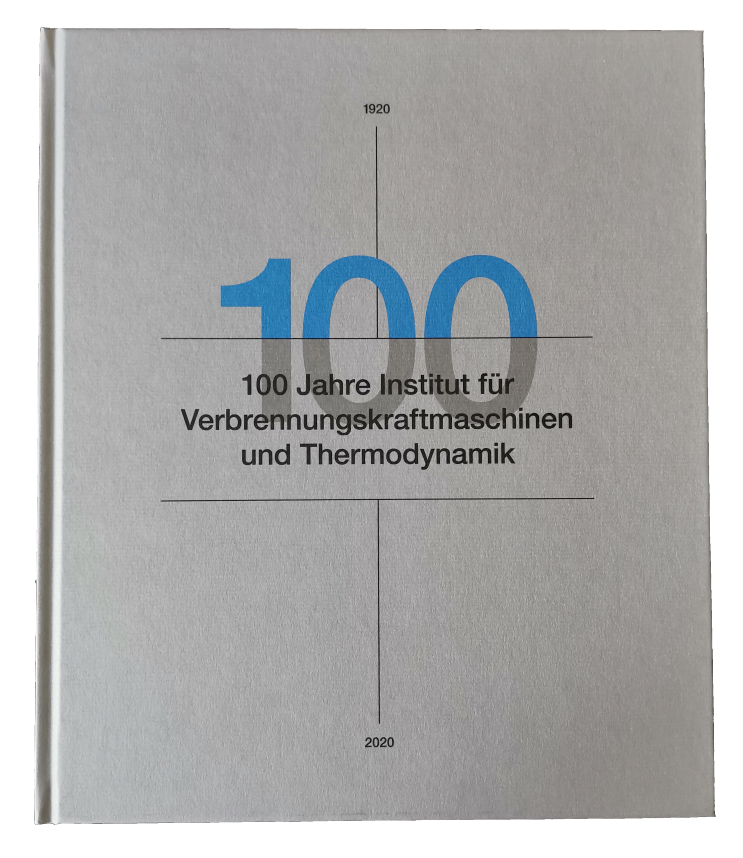100 years of IVT - book presentation
 In 1920, the dynamic development of the comparatively young scientific discipline of thermodynamics and its application to heat engines in connection with its, as it was said, "crucial importance for the energy economy of the state" led to the establishment of a chair at the Graz University of Technology. If one would like to give an exact date for this, the "new establishment of the Chair of Thermodynamics and Combustion Engines on October 1" can be mentioned.
In 1920, the dynamic development of the comparatively young scientific discipline of thermodynamics and its application to heat engines in connection with its, as it was said, "crucial importance for the energy economy of the state" led to the establishment of a chair at the Graz University of Technology. If one would like to give an exact date for this, the "new establishment of the Chair of Thermodynamics and Combustion Engines on October 1" can be mentioned.
In the past 100 years, the institute has experienced a unique and almost unbelievable development. This development enabled the training of many students in the fundamentals of thermodynamics as well as its applications at the current state of the art. The development of the research activities and the scientific results can be traced very well on the basis of the more than 1000 diploma or master theses, 343 dissertations and 22 post-doctoral theses that have been written since the beginning and are listed in the appendix. Thus, over the years, the institute has also been a place of work for many female employees. The research activities not only allowed the employment of female staff via third-party funds, they also supported and still support the specific Austrian industry and formed the basis for the foundation of several companies. Currently, about 120 female employees work at the institute and the research company. If one were to include the environment of the closely associated companies LEC and HyCentA, which emerged from the institute, the number would be well over 200 employees.
What has remained constant over the years is that the research is application-oriented and is directly incorporated into teaching. Likewise, the attitude formulated by the first director of the institute, Julius Magg, "Theoretical preliminary work has always been cheaper than the experiment, especially than the experiment that is not supported by any theoretical background", is still fundamentally valid today, even if the "theoretical background" has of course changed considerably: Numerical simulation, phenomenological and data-driven modeling and their methodological further development form the backbone of the research work, along with excellent experimental equipment and measurement technology.
They initially extended to internal combustion engine applications with fundamental investigations of working procedures, possibilities for their computational treatment and development of analysis procedures, use of different fuels, etc. In the first 30 years, diesel engine combustion processes, large engines, turbocharging concepts, combustion processes for unconventional liquid and gaseous fuels, two-stroke direct injection processes and calculation methods for mapping the engine working process, such as thermodynamic loss sharing, were developed, to name just a few examples. Over the years, the research work extended to more and more applications such as compressors, refrigeration systems and heat pumps. Even the first jet engines were worked on in research projects. In recent decades, the focus has increasingly shifted to questions of pollutant emissions and climate-relevant exhaust gases, as well as to the environmental impact of traffic, leading to the establishment of separate research areas. Their work ranges from the measurement and simulation of emissions and energy efficiency, participation in legislative frameworks to questions of environmental compatibility, in particular air quality in urban areas and tunnel ventilation and safety, including fire cases. In research work on future propulsion systems, the focus is accordingly on the objective 20 Professors at the Institute 2020 of minimal or negligible emissions, often characterized by the term "zero impact". The fact that hydrogen can and will play a special role as an energy carrier has already been shown by the work of recent years, which will also be intensified in the future.
The entire variety of propulsion systems that come into question and are dealt with at the institute will soon be reflected in an adjustment of the institute's name. The research and development of environmentally compatible, sustainable propulsion systems made for an extremely exciting and challenging time for all involved, with competence and application of thermodynamics being of fundamental importance. This is true whether we are talking about thermal management of vehicle powertrains with battery electric systems, thermodynamics of fuel cells, or internal combustion engines with sustainably produced fuels such as e-fuels.
This chronicle is intended to show both the historical development and the current focus of our work. I would like to thank Bernhard Reismann for writing the historical part of the chronicle. He has meticulously researched the first 50 years of the institute, mainly on the basis of the rectorate files, and summarized them in a compact and exciting way. Rudolf Pischinger, who led the institute as a board member from 1970 to 2002 and initiated significant thematic expansions of research activities as well as extensive third-party funding activities, wrote the article on this period, for which I would also like to express my gratitude. The current status of our research activities has been written by the heads of the research areas shown on the following pages - many thanks for this. Together with all the dedicated staff, they form the "drive system" of the Institute. Special thanks are due to all of them, who were and are responsible for the successful development and the existence in its present form. I would also like to express my heartfelt thanks to our partners from the university, research institutions, industry and public authorities for their excellent cooperation. These were and are the basis for exciting, extensive research activities of high social relevance.
If you are interested in the publication, please contact Bitte Javascript aktivieren!.